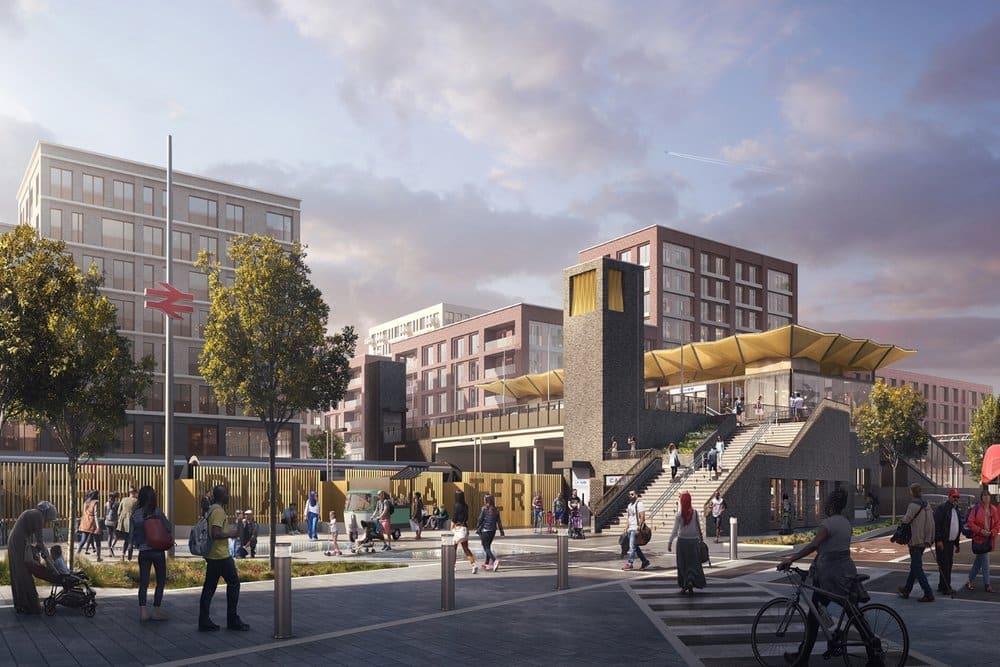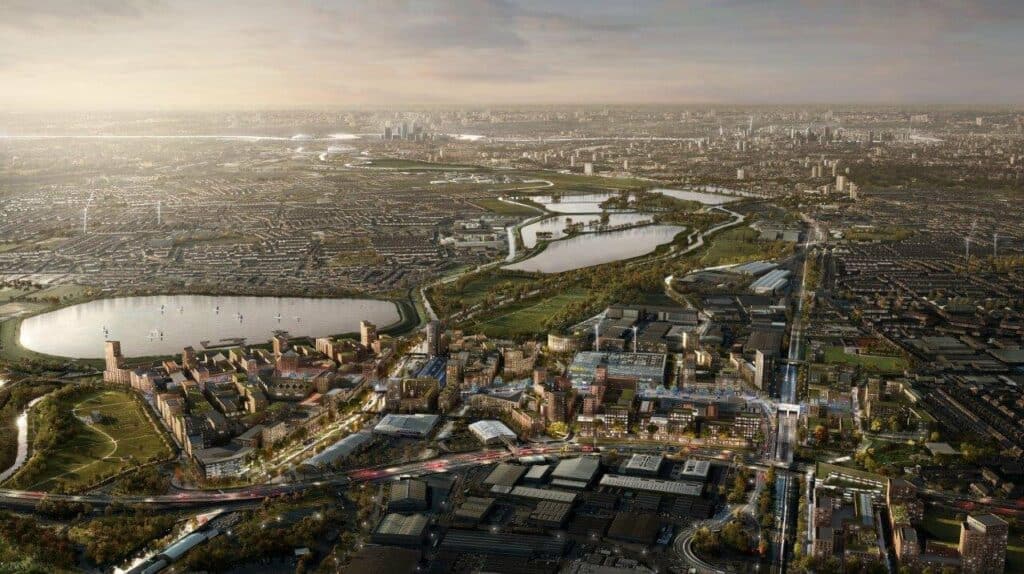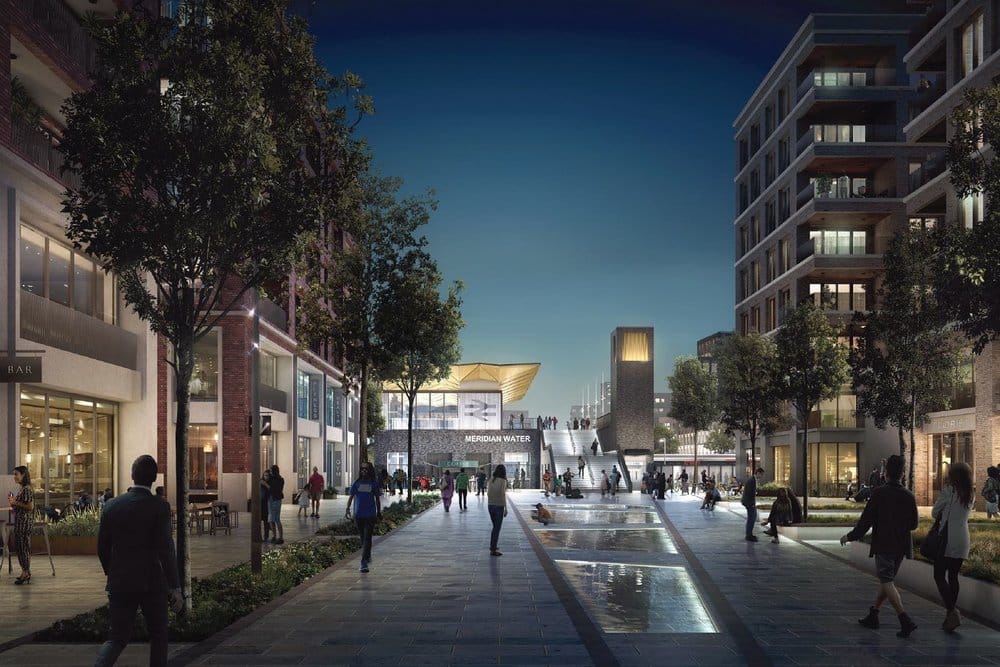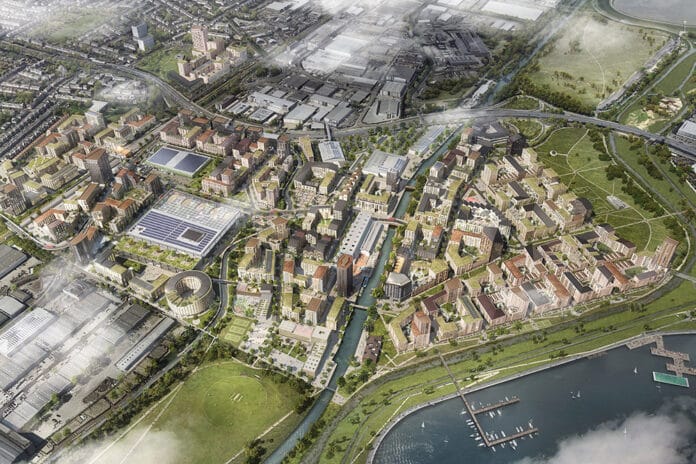Peter George, Meridian Water Programme Director, London Borough of Enfield, and Damien Gent, Managing Director, CPMS Infrastructure, talk about the ground-breaking work undertaken by the London Borough of Enfield to deliver the rail infrastructure needed to increase passenger capacity at the newly built Meridian Water rail station and regenerate brownfield land to make space for up to 13,000 new homes and create over 6,000 new jobs in north-east London.
Rail investment in mainline infrastructure has traditionally been the domain of Network Rail. It is also often perceived as having challenging levels of complexity, thus deterring businesses, local councils and funders from wanting to invest or commit to any project with rail at its core.
For the London Borough of Enfield, rail investment is an essential part of its ambitious 13,000 home Meridian Water development project which aims to transform a swath of disused brown field land into a new, vibrant and attractive area of the borough, and offer the essential housing, jobs and facilities that are so desperately needed in that part of north-east London.
From the moment the Meridian Water project was conceived, Peter George, Meridian Water Programme Director, London Borough of Enfield, acknowledged that the biggest challenge faced by the project team was delivering an infrastructure that could support a train service frequency that could sustain a ‘turn up and go’ philosophy and the replacement of the old Angel Road station with the iconic Meridian Water station.
Phase 1 of the project was the construction of the new Meridian Water rail station. Phase 2 was building the rail infrastructure which would support the increased rail traffic. Phase 3 was the regeneration of the area, the procurement of new homes and creation of new jobs.

Working closely with industry partners, specialist suppliers and Network Rail, Peter’s team commenced the long and often challenging journey towards achieving Phase 1 of the project, the creation of the landmark new Meridian Water rail station. Reflecting now, Peter acknowledges that the Borough learnt a lot during the design, construction and entry into service phase of the new station, ‘at times, the opening of the Meridian Water rail station in 2019 looked heroic’ he said with a smile.
In terms of process, Peter’s team at the London Borough of Enfield followed the well-worn and traditional route of capital investment in rail projects, acting as a light touch client whilst Network Rail developed, designed and built the station. It was challenging but the new Meridian Water Rail station was successfully opened in 2019. Next was the even more ambitious task of completing the pivotal Phase 2: delivering rail infrastructure necessary to support a train service frequency that would make Meridian Water a destination served by six trains per hour, just 18 minutes from central London.
“We had to take some bold decisions,” Peter states “to realise our ambition, we knew that time was of the essence. We had made a commitment to our communities to start delivering new homes from 2023. However, when we started looking in more details at the industry norms we had to comply with, the completion date kept shifting to a much later end date, and that simply did not work for us.”
To address this, Peter set up its own project team which role was to develop a solution that could support the step change in train frequency and allow Phase 2 of the project to be completed with the stated timeline. For its project team, Peter engaged with industry partners and, benefiting extensively from Network Rails ‘Open for Business’ approach, established a small, lean, team which included experts from a dynamic and agile SME rail consultancy company that would help manage, shape and design the solution for the Borough.
“We knew we needed to significantly increase the number of train services per hour to support housing delivery from 2023. That was all we knew. However, we had confidence that the rail industry contains the expertise we needed to find a workable solution and we therefore opted to ‘self-deliver‘ this project and appointed CPMS as our rail consultant.”
“It was an interesting first meeting,” Damien Gent, Managing Director of CPMS Infrastructure explains. “It was one of those moments when the enormity of changing the West Anglia Mainline sinks and you subconsciously have a choice of panic, run and hide or grabbing hold of it with both hands and asking when can we start. We went for the latter without any hesitation.”
From the outset, CPMS highlighted that a combination of infrastructure and operational changes would be required to achieve the outputs required. The congested nature of the route and the need to protect key journeys in and out of London would require the ability to regulate and pass trains along the route in order to provide the desperately needed network capacity to facilitate additional stops at the Meridian Water rail station.
CPMS’ rail industry knowledge, experience and design capability, combined with a dynamic, passionate and agile team, provided the best platform from which to start the development of the project. A super charged GRIP1 identified that the only way of achieving a sustainable and cost-efficient solution to Phase 2 was to provide a passing loop (an overtaking line) at Ponders End, just to the north of the Meridian Water station and to amend the calling patterns of existing rolling stock.
“Looking back, we identified ten core options which, when debated with the industry stakeholders expanded sixfold to take into account all the possible permutations. Very few of the proposed options hit the sweet spot of balancing the timetable with the ability to construct infrastructure on a congested route,” Damien recalls, “plus we also had to be mindful of any future fourth tracking project’.
As CPMS pushed on with the development of the Phase 2 design, Peter’s Rail team established a Steering Group tasked with bringing together key industry partners to develop the Outline Business Case and establish the delivery programme. At the same time, Network Rail appointed a Senior Sponsor for the project and engaged their Third-Party Asset Protection team. With further support from other industry partners, including Abellio Greater Anglia and Transport for London, the project gained momentum.

The complexity of Phase 2 of the project was very high. The West Anglia mainline is one of the most congested routes into London. Consequently, the team had to find a way to reconcile increased capacity and trains stopping at Meridian Water station with ensuring high speed trains could still pass through the station seamlessly. This was a very challenging task. The solution which received the most support and proved the most viable was to install a new passing loop, approximately 1700 metres of new track at Ponders end, and to create a bi-directional section on the mainline heading towards London, as well as to implement broad changes to the signalling, telecoms and Overhead Line power systems to align with the new track position. This infrastructure solution provides the capacity within the rail network to then consider the timetable changes required to increase the frequency of services calling at Meridian Water.
“It’s a complex balance between the infrastructure and the operational priorities, and a credible and robust solution could only be achieved with the highest level of involvement from key stakeholders,” Damien states.
In the autumn of 2020, Phase 2 of the Meridian Water project was successfully completed, securing Department for Transport support and passing through the relevant RNEP and Network Rail GRIP gateways. Minister Heaton-Harris and the Secretary of State have now confirmed Rail Board’s approval of the outline business case (OBC). With the funding already provisioned by the Ministry of Housing, Communities & Local Government (MHCLG), it is all systems go for Peter George, his Enfield Rail team and their supply chain partners.
“With the support of the industry and the success of Phase 2, we have the confidence to take on the self-delivery of the project in its totality,” Peter states, “and we feel that we can build a network of supply chain partners capable of delivering this challenging project by December 2023.”
The London Borough of Enfield has decided to manage the remaining stages directly, supported by a collaboration between CPC and CPMS, the appointed management team until the project is completed in May 2024. The Borough has also commenced the procurement process the Stage 4 Design and Build contractor and will shortly be approaching the construction market ahead of a Winter 2021 award.
Peter suggests that “anybody wanting to take the lead role needs to recognise that rail investment isn’t easy, projects take time and lots of effort. However, the industry is a hugely supportive community and spear heading a significant infrastructure project is not beyond a third party as long as they understand the rules, work with the rail partners and find joint ways to overcome problems.”
Key industry partners, including Network Rail, Abellio Greater Anglia and the Department for Transport have all been hugely supportive of the approach taken by the Borough’ Damien acknowledges’ and the professional work undertaken by CPMS and ARUP, who completed the final Outline Business Case, has transformed a concept into a credible project.

For more information on the project and the outstanding regeneration project that is Meridian Water, please visit the London Borough of Enfield’s website, www.meridianwater.co.uk
Photo credit: CPMS
Click here to view Network Rail’s installation of an 11,000 tonne railway tunnel.







































 0113 2082620
0113 2082620 info@railbusinessdaily.com
info@railbusinessdaily.com 15 Mariner Court, Wakefield WF4 3FL
15 Mariner Court, Wakefield WF4 3FL

